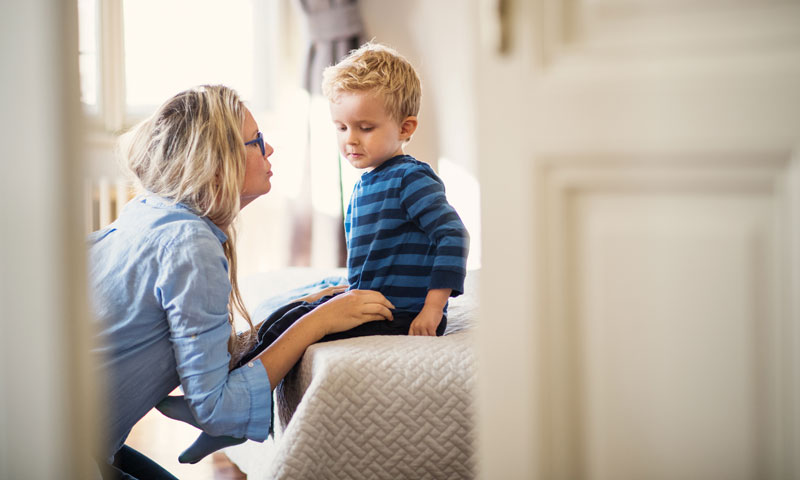Just when you thought your child was completely potty-trained, your child is now having accidents again – during the day. Could this daytime wetting be intentional? Is something wrong?
"No need to worry right away," says Janelle Traylor, APRN, FNP, a Urology Nurse Practitioner at Children's Health℠. "Daytime wetting in children who were potty trained is fairly common. It's called urinary incontinence, the uncontrolled leaking of urine. And, as upsetting as this can be for parents and kids, there's usually a reason that can be addressed and resolved."
Why is my potty-trained child having accidents?
Every child is different, but most begin to potty train as toddlers. In general, children have daytime bladder control by about age 4. Nighttime bladder control often follows within a few months (learn more about bedwetting at night). When a potty-trained child suddenly starts having accidents at home or wetting themselves at school, there may be physical causes such as constipation, or there may be behavioral or developmental reasons.
What are physical reasons for daytime wetting?
If you're researching daytime wetting, you might come across the term voiding dysfunction. This means that the child is not able to store urine appropriately or entirely empty (void) the bladder, which often leads to accidents.
Some children simply have a bladder that acts small, meaning it is functionally smaller even though it is structurally a normal size. This can make them more prone to wetting accidents. However, the most common physical reason for daytime wetting is constipation.
Constipation
Traylor says that up to 70-80% of children who have accidents during the day due to physical reasons are constipated.
"The bowels are positioned close to the bladder. When the bowels are full and don't empty, the stool puts pressure on the bladder – so much pressure that the bladder cannot empty or fill completely," explains Traylor. "The pressure on the bladder causes many children to wet their pants."
To find out whether constipation is causing your child's daytime wetting accidents, your physician may perform a physical exam or order imaging if needed.
Tips to prevent and treat constipation: Encourage children to eat more fruits and vegetables, drink more water and participate in physical activity. If constipation is more severe, your physician may prescribe a stool softener to help clean out the bowels. See other common causes of constipation in kids.
Urinary urgency and overactive bladder
Another physical reason behind daytime wetting is urinary urgency. Chances are, you've experienced a "I have to go right now" situation with your child at least a time or two. With this sudden urge to urinate, some children don't make it to the toilet in time.
Tips to prevent and treat urinary urgency issues: Your child's physician can look for possible physical causes. Sometimes the solution is a matter of simply helping children learn to relax and take their time when going to the bathroom. By relaxing, they can empty the bladder more completely, so they do not experience that sudden urge to go. Having scheduled times for toilet breaks can also help prevent urgency.
Other physical reasons for daytime accidents
Other possible physical reasons for daytime wetting include:
- Urinary tract infections (UTIs) – UTIs are a common and treatable condition in kids that may cause frequent urination
- Urinary tract abnormalities – Doctors can perform sonograms to make sure urine can pass through the bladder properly and completely
- Spinal abnormalities – May impact the coordination between the bladder and the muscles that control urination
- Diabetes – May increase the child's need to urinate more frequently
What are psychological reasons for daytime wetting?
If your child suddenly starts wetting during the daytime hours at daycare or school, the cause could also be psychological or behavioral. Some causes may be:
- Fear of missing out – Children in preschool and the early grades may be afraid they'll miss something socially if they go to the restroom. Or, they're so engrossed in their activities that they don't realize they need to go. Similarly, at home, some children are so captivated with their play or video games that they don't take time to go to the bathroom. While they may say, "I didn't feel it," it is more that they ignore the feelings.
- Bullying – Some children are scared to use the restroom at school because they might get "picked on" for some reason. Look for signs of bullying and talk to your child if you are concerned.
- Academic stress – Some children are so afraid they'll miss important information during class that they delay going to the restroom. Doctors see school stress and urinary issues in children of all ages, including teens hoping to get into certain colleges.
Do children wet their pants for attention?
Many parents wonder if their once potty-trained kids are deliberately wetting their pants during the daytime. Traylor says she does not see intentional wetting among patients too often. Still, when it does happen, the child is usually trying to get attention due to some type of psychological stress.
"If we think children are intentionally wetting or deliberately urinating on the floor, we try to figure out what's going on," says Traylor. "Some children do this because they're dealing with a lot of stress or changes at home."
What are developmental reasons for daytime wetting?
Sometimes daytime wetting is linked to developmental issues, meaning a child just isn't ready yet to stay dry at all times.
Attention Deficit Hyperactivity Disorder (ADHD) and daytime wetting
Be aware that some children who have ADHD may regress. Even after they've been potty-trained, they may start wetting their pants.
"For children with ADHD, it's very important that parents set them on a potty schedule," recommends Traylor. "Otherwise, they get so preoccupied that they forget to go to the bathroom. It's not that they're doing it intentionally, they really just get busy and forget."
Autism and daytime wetting
Children with autism spectrum disorder (ASD) may suddenly start having daytime wetting accidents because they were not actually ready to start potty training in the first place.
"Realize it's not uncommon for children with autism to show regression. The fact is, they may not be ready for potty training until the age of 8 or later," says Traylor. "Parents can help their child by setting potty schedules and giving lots of rewards and positive reinforcement."
How should parents respond when a child wets their pants during the day?
If your child is having an increased amount of daytime accidents, here are ways you can help:
- Don't scold your child for wetting or accidents.
- Set a bathroom schedule. Encourage your child to use the toilet every two hours. "Often, children say they don't need to go, but encourage them to sit on the toilet anyway," advises Traylor. "We see a lot of improvement with this. In many cases, going to the bathroom every two hours fixes daytime wetting issues."
- Teach your children to relax and take their time when going to the bathroom, so they're more likely to empty the bladder completely.
- Encourage your child to eat plenty of fruits and vegetables, drink water and enjoy lots of physical activity.
- Limit soda and tea. Drinking caffeinated beverages can increase urine output and make the bladder more active.
- Send a doctor's note to school asking that your child be allowed to go to the restroom when needed and to take as long as necessary.
- Send children to daycare or school with a change of clothes. (A darker pair of jeans or a printed skirt with shorts helps hide accidents.)
- Don't stress. "Stress is contagious. Often, when parents stress about their kids' potty habits, the kids stress too," says Traylor. "Know that it will be okay; this can be treated."
What are the signs you need to consult a physician about your child's daytime wetting?
Daytime wetting and accidents may resolve with your attention to the issue. It may take several months for your efforts to have a clear effect on your child's behavior. Being patient and persistent is key. You should contact your physician for advice if:
- You notice blood in your child's urine or stool.
- Your child's constipation does not resolve with improved diet, water, exercise and a regular bathroom/potty schedule.
- An older child (ages 10 and older) suddenly starts having accidents. In rare cases, some children develop spinal issues that lead to urinary incontinence.
Learn more
The Voiding Dysfunction Program at Children's Health offers management and treatment options for voiding dysfunction, from simple cases of bedwetting and daytime wetting to more complex cases, including painful voiding. Learn more about our program and treatments.

Thank you!
You are now subscribed to the Children's Health Family Newsletter.
Children's Health will not sell, share or rent your information to third parties. Please read our privacy policy.
